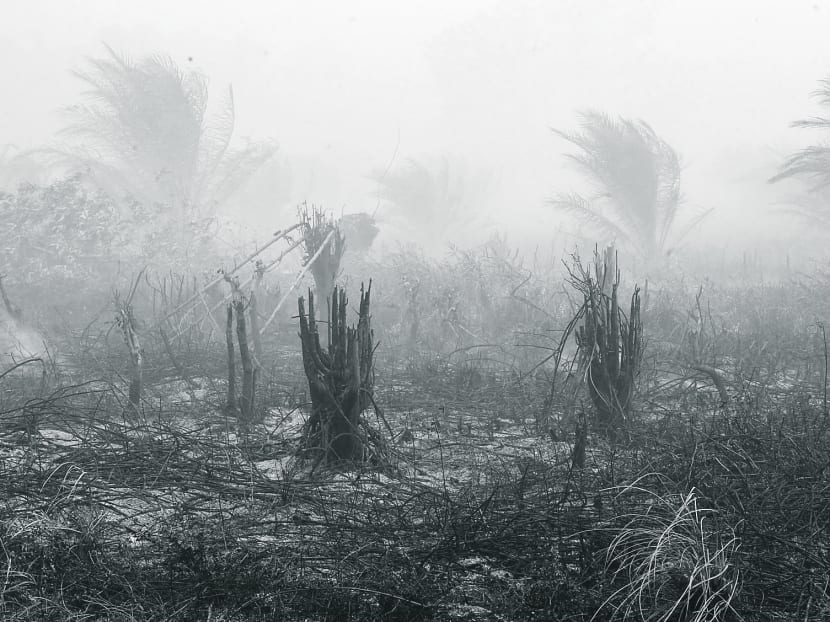More plantations, more haze to come?
In the wake of record levels of haze, environment ministers from Malaysia and Singapore will be meeting their Indonesian counterpart as soon as July 17 for the Ministerial Steering Committee (MSC).

Smouldering peatland in Riau, Indonesia. While fire has been traditionally used by smallholders for hundreds of years to clear land, the key difference today is scale. TODAY file photo
In the wake of record levels of haze, environment ministers from Malaysia and Singapore will be meeting their Indonesian counterpart as soon as July 17 for the Ministerial Steering Committee (MSC).
This follows the apology graciously given by President Susilo Bambang Yudhoyono and — more importantly — the actions taken by the Indonesian government to suppress the worst of the fires. Governments must do their part to signal, as well as to act.
But they are not the source of the problem. Past MSC meetings have recognised that palm oil corporations are key to reducing the haze, yet this is the first time that governments in Malaysia and Singapore have called for the companies to be named and pledged to act no matter what the nationality of these companies.
It is right to take action against errant corporations — not only to name them but also to shame and penalise them. While fire has been traditionally used by smallholders for hundreds of years to clear land, the key difference today is scale. The rapid expansion of plantations across Indonesia is the reason why it was only from the 1990s that the haze has caused alarm across the region; further growth explains many of the spikes in haze pollution since.
According to a report, the total plantation area in Indonesia grew by 50 per cent from 2005. Come 2020, this is slated to increase by a further 60 per cent — a total of five million hectares, about 70 times Singapore’s size. Unless the industry can be greened, more haze must be anticipated.
More information needs to be gleaned from transposing satellite images on maps of plantation concessions, but there are gaps in these maps. Plantations also claim that the fires were set by others or spread to their concessions from other areas. Ultimate ownership and responsibility are often ambiguous.
To establish the facts, much hard groundwork is needed. The Indonesian authorities can only do so much of this, given the vast land areas and limited capacity. Non-government organisations will need to work with the local communities to provide eyes on the ground.
To date, few cases have been brought to court and fewer still have been successfully prosecuted.
Given this, some argue that the entire industry must be boycotted. However, palm oil is near ubiquitous — contained in more than half the products sold in a typical supermarket.
Moreover, in a multi-billion-dollar industry, Indonesia is the world’s No 1 producer, Malaysia is second and Singapore supports the trade and financing with some major producers based and even listed here. Governments want to solve the haze but would not want to kill the industry.
TRACEABILIITY IS KEY
Instead of a blanket ban, effort must be made to recognise and incentivise companies to act sustainably. This is best done in tandem with prosecutions, as a stick-and-carrot strategy.
Some palm oil companies do try to institutionalise sustainability plans. When quizzed, Golden Agri-Resources and Wilmar International have been quick to reiterate their zero-burn policy. But having a zero-burn policy is different from enforcing one.
Certification will be essential to differentiate between those who are green from those who merely claim to be. One attempt has been made by the Roundtable on Sustainable Palm Oil (RSPO), an industry-led effort. But, with some RSPO members accused of using fire, some question the group’s effectiveness. Investigations by RSPO against errant members will be closely watched to see if companies dodge responsibility or take steps to reform.
Another measure is to provide traceability — so that traders and buyers in the supply chain can trace the product back to the producer and precise plantation. The demand for traceability of food produce has grown and some companies such as Nestle now commit to using only traceable palm oil. Many others, however, still trade and purchase uncertified and untraceable palm oil.
Citizens — not just in Singapore and Malaysia but also in Riau nearest the fires — have called for the haze to be ended. Governments are starting to address the issue, notwithstanding political sensitivities and the urgency of the meeting of environmental ministers signals progress. But there are clear limits to what environmental ministers can command without the buy-in from their ministerial colleagues in charge of the economy and industry.
Governments will have to coordinate between the environmental ministers who will meet and their counterparts in charge of economic and industry matters. Only then will palm oil and other resource companies have the right stick and carrots to green their businesses.
ABOUT THE AUTHORS:
Simon Tay is Chairman and Chua Chin Wei a Deputy Director of the Singapore Institute of International Affairs.






